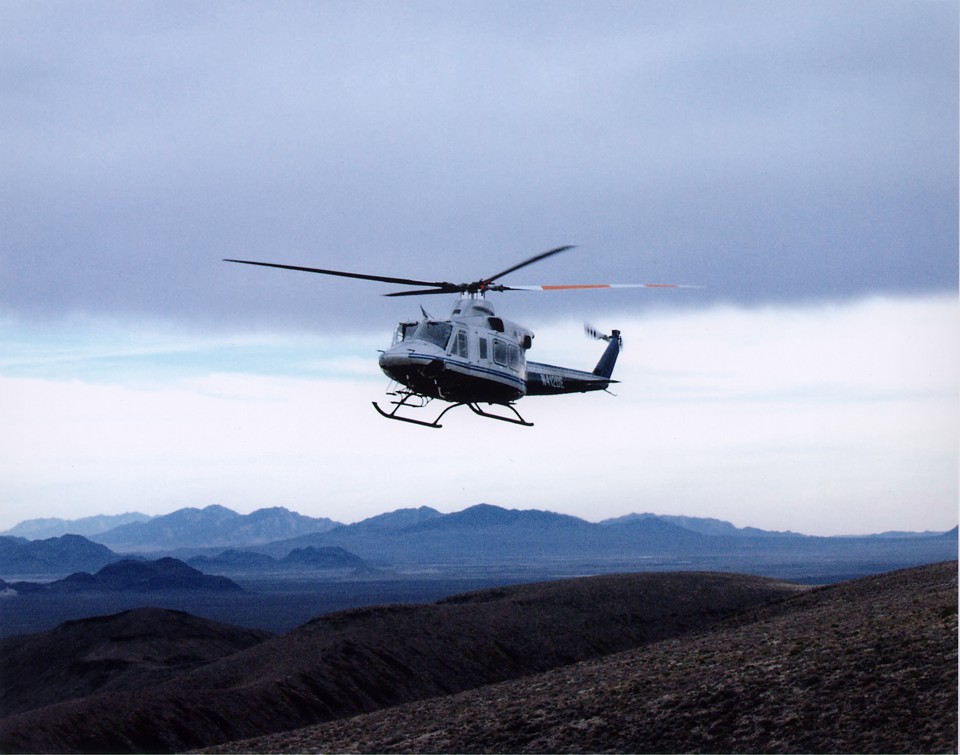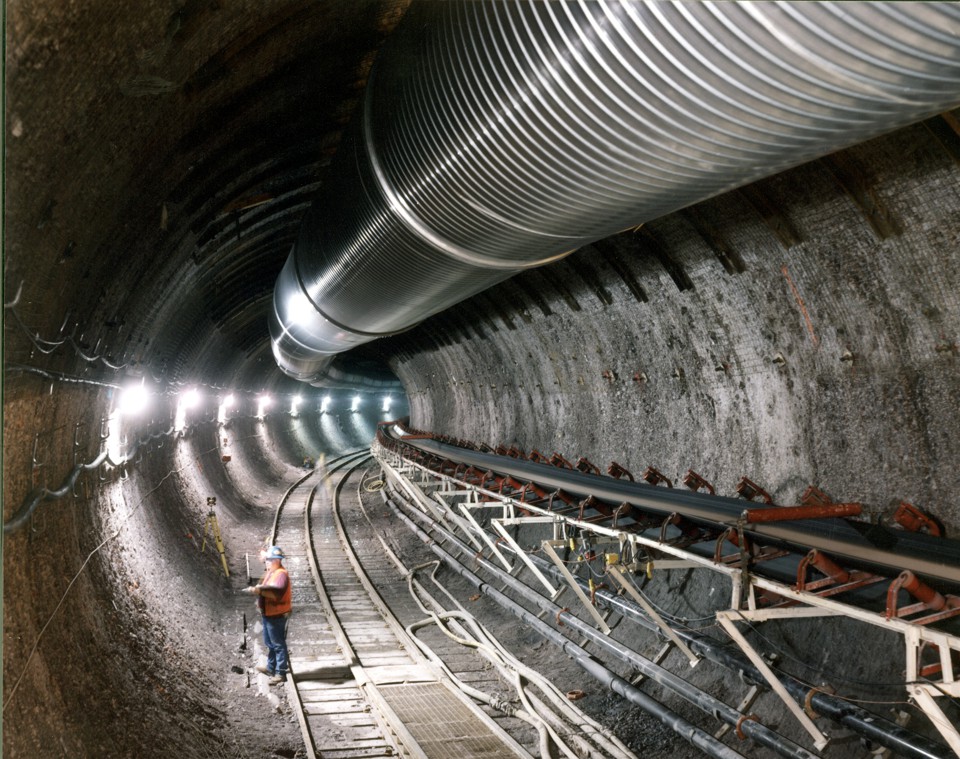The White House Revives a Controversial Plan for Nuclear Waste

The south portal of the proposed Yucca Mountain nuclear waste dump near Mercury, Nev. John Locher/AP file photo
Yucca Mountain is back, and Nevadans are not happy.
Near the southern tip of Nevada is a ridge politicians have been fighting over for 30 years.
Yucca Mountain was designated the permanent underground storage site for nuclear waste in 1987. It had an ambitious mission—to entomb high-level radioactive waste safely for at least 10,000 years—and a tentative opening date of 1998. But the process of even approving its construction has dragged on through four presidents. In 2011, the Obama administration officially mothballed the project.
Then it was Trump’s turn. In a proposed budget last week that otherwise slashes non-defense spending, the Trump administration found $120 million to restart an approval process for Yucca Mountain. The project that former Nevada senator Harry Reid, perhaps its fiercest critic, denounced as “dead” is back.
“You’d have to say the glass is half full for Yucca Mountain,” said David Blee, the executive director of the United States Nuclear Infrastructure Council, a consortium of nuclear industry companies that support the project. While not exactly exuberant, it’s the most optimistic assessment of Yucca Mountain in years.
Considerable challenges are still head for reviving the project. Assuming Congress approves the $120 million, the federal government faces deeply entrenched opposition in Nevada. The state has filed 218 contentions against the Department of Energy’s application for the storage site, detailing both technical and legal concerns. Going through the contentions will take an estimated four to five years of hearings and cost the federal government $2 billion—all before the shovel even hits the ground.
Nevada’s governor and five of its six members of Congress have already come out swinging against the latest attempt to revive Yucca Mountain. “Republican, Democrat, independent—there is enormous opposition to Yucca Mountain,” said Robert Halstead, executive director of Nevada’s Agency for Nuclear Projects.
* * *
The state’s objections to Yucca Mountain originate with how it got chosen in the first place. When Reagan signed the Nuclear Waste Policy Act of 1982, the country’s nuclear weapons program had left tons of radioactive waste, and spent fuel from nuclear power plants was also piling up. The law directed the Energy Department to study several sites around the country, but politicians didn’t want to pay for the expensive and lengthy technical assessments of all the potential sites. So in 1987, Congress amended the Nuclear Waste Policy Act to designate Yucca Mountain as the one permanent storage site.
Why Nevada? The three finalist sites were in Texas, Washington, and Nevada. At the time, the speaker of the House represented Texas and the majority leader Washington. The amendment became known as the Screw Nevada Bill. “Clearly, the mistake we made in 1987 was jamming it down the throat of the Nevadans,” a government official later told Nature.
Nevadans also have safety concerns. The Nuclear Regulatory Commission, the federal agency that approves radioactive-waste storage sites, published a long-delayed report in 2014 deeming Yucca Mountain safe. But critics worry that groundwater in Yucca Mountain could corrode the canisters that store nuclear waste, causing a radioactive leak.
Planning a 10,000-year storage site is bound to be complicated; if built, it would need to last longer than any piece of infrastructure in history. But efforts really sputtered out after Reid became Senate majority leader and Obama took office—both of whom are opposed to the project. They never had enough votes to outright kill it, despite Reid’s boasts, because Yucca Mountain was written into law. So they stalled.

“The Obama administration was a paper exercise,” said Blee. “At the end of the day it succeeded in generating a lot of paper but no concrete action.” For example, the Energy Department needs a license to build Yucca Mountain from the Nuclear Regulatory Commission. In 2010, Obama’s energy department tried to withdraw its application for Yucca Mountain. The NRC voted 2-2 on whether the department could actually withdraw it, which resolved nothing. Meanwhile, Washington simply stopped funding the offices working on Yucca Mountain. Staff were reassigned, and offices emptied out.
The Senate is trickier. A sticking point is whether to fund an interim storage project while Yucca Mountain winds its way into existence—there’s support in the Senate for it but not the House. In the past, Senators Lamar Alexander and Dianne Feinstein have also introduced bipartisan legislation on nuclear waste issues. With Reid as majority and then minority leader, it never got far. Nuclear industry lobbyists suggested that any pro-Yucca Mountain bill could contain financial incentives for the state of Nevada. (Local Nye County officials, where the facility would be located, support Yucca Mountain because of the jobs it would bring in.)
Once the Energy Department and the NRC have both the budget and staff, they actually need to go through the long-delayed approval process. Here is where Nevada’s 218 contentions come in, and the state is gearing up for a fight.
In fact, it’s been gearing up for a while—since Reid announced his retirement after an eye injury in 2015. “I knew that morning when I heard the news of his decision to retire following the injury that the Yucca Mountains proponents in Washington—in Congress and in trade groups like the Nuclear Energy Institute, the United States Nuclear Infrastructure Council, and the two professional societies, the American Nuclear Society and the American Physical Society—that they would all immediately start fantasizing about, ‘Oh, now we can have Yucca Mountain again!’” said Halstead.
The Obama administration also appointed a Blue Ribbon Commission on nuclear waste that recommended a “consent-based process” for finding a new location in a state that was not so vigorously opposed to it. That process never got off the ground.
* * *
Since Obama never undid any laws about nuclear waste, the path for Yucca Mountain is still there. Trump’s proposed budget takes a small step forward. If passed, it would provide funding to rehire staff at the Energy Department to get the Yucca Mountain application through.
The House would likely pass such a budget easily. In fact, it has sneaked Yucca Mountain funding into budget bills in the past. “There has been a firewall of support in the House for Yucca Mountain,” said Blee. Illinois congressman John Shimkus, a strong backer, also plans to introduce legislation solving land- and water-rights issues around Yucca Mountain.

The 218 individual contentions run the whole gamut, from volcanic-hazard estimates to corrosion risks to legal concerns about how the government has handled the process. The state is also preparing 30 to 50 new contentions to stop the project.
Assuming that the NRC approves the project, the state will put up more roadblocks. “The first thing we’re going to do is go back court and sue them over the radiation protection standard,” said Halstead. Nevada contends that standards the government used to decide that Yucca Mountain are safe are too lax. In a statement responding to Trump’s budget, Nevada’s attorney general, Adam Laxalt, also said to expect “many years of protracted litigation in which we are confident we will ultimately prevail.”
If the Energy Department does get its license for Yucca Mountain, it would also need to develop a plan for operating the facility, including a monitoring program to guard against radioactive leaks. Energy Secretary Rick Perry has said he wouldn’t rule out Yucca Mountain. On Monday, House members Greg Walden and John Shimkus sent Perry a letter detailing how to move forward on the project.
President Trump himself has made no clear public comments about Yucca Mountain, and it’s unclear how committed the administration will be in the budget process. One of Nevada’s major concerns about the project is tourism. Nuclear waste from all over the country would converge on Yucca Mountain, which is about 100 miles from Las Vegas. Days before Trump’s inauguration, the project’s critics offered up a new line of attack: Trains hauling nuclear waste would be running near Trump International Hotel Las Vegas.
NEXT STORY: With a Daily Dial, Police Reach Out to Seniors





